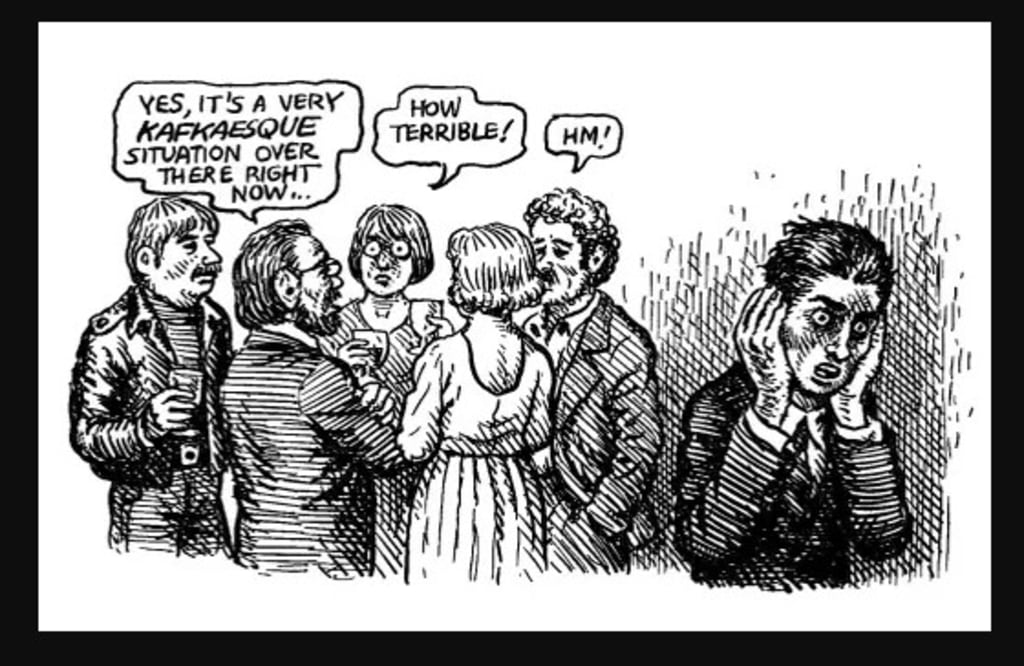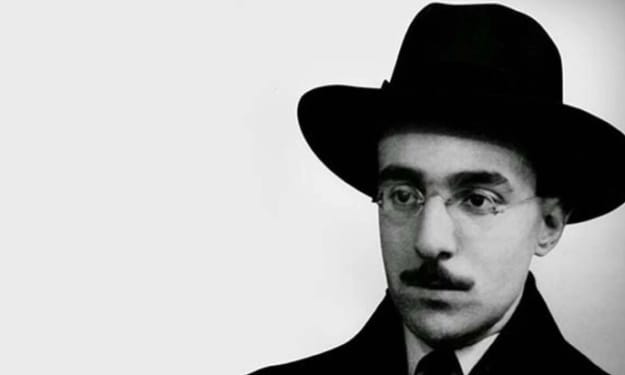Kafkaesque: What Is It? - Franz Kafka's 'Philosophy'
Kafka's 'Philosophy'

One of the most influential writers in recent memory is Franz Kafka. He is renowned for his singularly dark, strange, and fantastical writing. Anything that mimics a certain style and quality that still exists is said to as Kafkaesque. To comprehend his writing's Kafkaesque characteristics It is beneficial to comprehend his early years. The couple Hermann and Julie had a son named Kafka in Prague in 1883. His dad was a highly successful, wealthy businessman who, as parents often do, rose from the working class, built a great company, married an educated woman, and joined the upper middle class via pure force of will and an outspoken, assertive attitude. Hermann desired a child who would be as tall as his ideal human being. That was not Franz Kafka. Franz was a little, fearful, and ill child at birth, and he largely stayed that way as an adult. Franz ended up being his father's worst disappointment and a kind of psychological punching bag as he tried to change him into the person he always wanted to be but was unable to be.
Franz experienced an impulse to write throughout his adolescence as a way to cope with his mounting fear, remorse, and self-hatred. Of course, his father forbade him from pursuing literature, ultimately drawing boundaries around Kafka's life and forcing him to become a lawyer. Kafka continued to write and met one of his only true pals, Max Brod while studying law in college. Another author was ultimately responsible for persuading Kafka to release his first three volumes of writing. But these pieces essentially went unrecognized and sold poorly. After graduating from college, Kafka went on to work for a financial institution and subsequently a law firm. Kafka would then have to deal with lengthy periods of unpaid overtime, a tonne of paperwork, and ludicrous, convoluted bureaucratic processes. It's understandable why Kafka was unhappy. Kafka continued to write on the side while employed at the insurance firm. producing The Trial, The Castle, and America, some of his most renowned works. However, he did not attempt to put out any of these at the time and even abandoned a lot of his work because he felt it was unworthy. For the better part of his remaining brief life, Kafka continued to work at the insurance firm while continuing to fit writing into his schedule. He passed away from TB at age 41 in 1924. Kafka never published any more of his writing and never enjoyed any success or acclaim for the little he did publish. He passed away thinking his work wasn't very excellent.
Even on his deathbed, Hitler gave Max Brod the order to destroy all of his manuscripts that were unpublished after his passing. Brod disregarded Kafka's advice because we are still discussing him 100 years later. After Kafka passed away, Brod worked for about a year to compile and publish his manuscripts and notes. In the years that followed, Kafka would rise to prominence as one of the 20th century's most important writers and thinkers. In simple terms, one of the greatest authors and philosophers of the 20th century spent his entire life hiding his writings away in a drawer. He was perched on some of the most important pieces of recent history, whether he was aware of it or not. In his father's view, he had lived his entire life. Despite being a pitiful disappointment, he is a very significant figure in history. How many people like Kafka have existed and are still alive today is a mystery. completely cut off from or unable to see who they truly are or maybe.
How many Kafkas existed and passed away without ever giving the world the voice that would have eternally transformed it? How many people have no idea what they'll become when they pass away? Fortunately for everyone but Kafka, his works were preserved, and a brand-new school of thought and literature was established in his honor. Kafkaesque In most cases, the word "Kafkaesque" is used to describe how bureaucratic capitalistic, judicial, and governmental systems are. the kind of convoluted, hazy procedures where nobody ever really fully understands what is happening and the system has no interest in it. However, the Kafkaesque quality also appears to go far beyond this. It isn't always exemplified by the nature of these systems alone. Instead, focus on how those who are exposed to them respond and what that can indicate. The Trial is one of his most well-known books. One morning, the main character Joseph K. is unexpectedly detained at his house. However, K is not told by the cops why she is being detained. And after that, he is made to sit through a protracted, pointless trial during which nothing is ever really clarified or makes much sense. K. is never told why he was detained and yet he is still guilty of his last conviction at the end of the book after having me enter the entire trial, which is rife with corruption and disorder.
In another of his better-known tales, Metamorphosis Gregor Samsa, the protagonist, awakens to find that he has mysteriously transformed into an insect. The earliest and most frequent troubles Gregor has in the book are getting to work, interacting with his boss, and supporting his ungrateful and impoverished family. Gregor obviously cannot accomplish this. Because he is a beetle, he feels more dread as he tries to cope with his predicament and avoid annoying his family. The main characters in both stories are thrust into unexpectedly ridiculous situations. There are no justifications, and ultimately there is little possibility of success. The random nonsensical barriers they encounter are stronger than they are. mostly because they are powerless to influence or understand anything that is happening. This conflict with the ludicrous seems to be the core of Kafka's writing and style. A situation in which a character's actions, thinking, and perception of reality are opposed by unavoidable limits of senselessness. In contrast, success is both unattainable and ultimately useless. Still, they give it a shot. It's reasonable to say that one interpretation of these events is that they represent Kafka's view of the human condition. Particularly, the unwavering hunt for solutions and victory over the existential issues of worry, guilt, absurdity, and pain. accompanied by the inability to ever genuinely comprehend or control the root of the issues and successfully resolve them. The most crucial aspect, however, is that despite ludicrous, hopeless circumstances.
The characters in Kafka's works don't immediately give up. They keep going and struggle against their circumstances, trying to make sense of them or find a method to make them make sense, but ultimately to no effect. Perhaps Kafka is implying in this that the search for comfort and comprehension is both inevitable and impossibly difficult. We struggle against absurdity as conscious, logical beings, attempting to reconcile the gap between us and the cosmos. Ironically, though, by attempting to resolve the unresolvable, we merely serve to prolong the very conflict we are attempting to end. And in this regard, we almost desire the conflict on some level. This is only one possible interpretation. Kafka's work ultimately lends itself to almost as many interpretations as readers because of its hazy, bizarre, and unintelligible qualities. Maybe the point is to accept our ridiculous situation and not take it too seriously. Perhaps the beliefs that we must fight against it or that we are unable to discern what the concept is.
In actuality, only Kafka could have ever fully understood the significance of his writing, and it's reasonable to assume that perhaps not even he did. But there is no denying that Kafka's writing has had a lasting influence on literature, philosophy, and society as a whole. It has made readers feel less isolated in their flashes of insight and Kafkaesque experiences throughout the world. Kafka's narrative is not very unique. His life was sad, despite his brutal father. Both were and are relatively frequent. To have a lousy family, a bad environment, a frail body, or a frail mind at birth? To be a bureaucratic cog in a business organization or governmental system, to live and die without ever realizing one's full potential. to have experienced existential guilt and distress without knowing why. The Kafkaesque has at least occasionally happened to all of us. The reason why Kafka's work is regarded as great is not because it portrays something fundamentally singular, but rather because it does so in an in-depth manner. An expression of a frequently unfathomable experience, a facet of life that affects us all. Kafka's writings, according to author Anne Rice, helped her realize the following strategy for her work. Kafka's writings are meant to confront the darkest sides of oneself directly rather than by offering false hope or delusion as cures for the soul. He disclosed a particular remedy of unrestricted self-examination and created a space in the outside world for others to perform the same by distorting actuality to more exactly map onto his interpretation of human experience. In a note to a friend, Kafka wrote. Although it's possible that you didn't say it out loud, Kafka's work represents and reminds us that regardless of all the absurdities and difficulties, we want to keep going. We want to fight the universe and pave our path. Despite how difficult it may be, we want to connect and find the truth.
About the Creator
Ian Sankan
I am a writer with proven writing ability in various fields. I consider writing a passionate career and a platform through which I extend my intellectual ability.






Comments
There are no comments for this story
Be the first to respond and start the conversation.